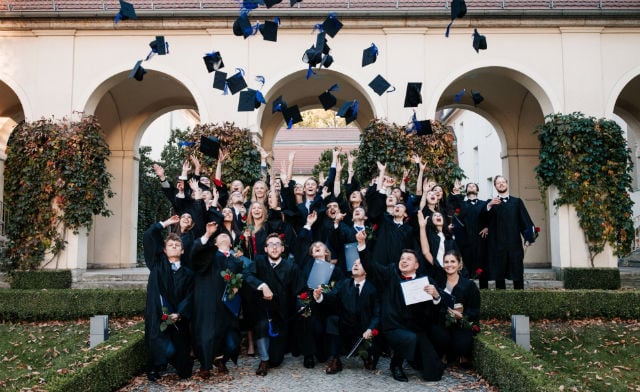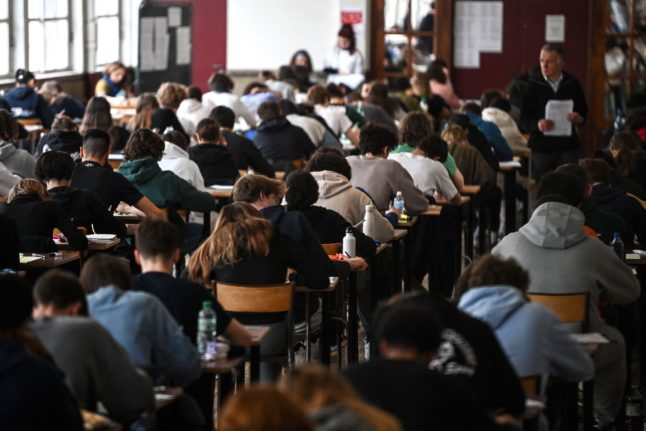Ellen Neschev grew up in a bilingual family in Germany and aspired to become a journalist, even interning at a regional daily in Düsseldorf.
But when the time came to choose a university, she was uncertain what direction to take.
“I found it hard to decide on one particular field at such a young age,” Ellen said. “A lot of young people struggle thinking that you have to take decisions right away, and that it must be the right decision.”
That was before she discovered the Bachelor in Management (BSc) at ESCP Europe, an international BSc that offers a diversity of subjects designed to equip students for life outside of the classroom, all taught over three years, in three countries.
Find out more about the Bachelor in Management (BSc) at ESCP Europe

Classes are taught entirely in English in the first year in either London or Paris, with some lessons in the local language possible the following years. Students also study French, Spanish, Italian or German to gain proficiency in the language of their chosen campuses in the second and third years.
Since graduating with the programme’s inaugural cohort in October, Ellen has had time to reflect on how the course influenced her current career, which it turns out is not in local journalism, but as a full-time account optimiser at Accenture for Google in Dublin.
“We always had the opportunity to do internships in any kind of field, whether it was a social project or an internship in finance,” Ellen said of ESCP Europe, adding that entrepreneurship was a common thread. “There is a great offer of courses, rooms and support, also from your professors, whenever you want to do a project or found a company yourself.”
The school’s career service in London, where Ellen spent her first year, helped secure her first internship, in wholesale for US fashion brand Juicy Couture, which she followed up with a product marketing internship at L’Oréal in Dusseldorf a year later.
Ellen’s experience is typical of what Bachelor of Management (BSc) students can expect, says Hélène Ourbak-Louit, who as Director of Studies pioneered the programme from inception through to the first graduation.
“The work experience gained through internships and the language skills acquired throughout the programme give students access to interesting jobs when they graduate,” said Hélène, admitting that even she was surprised at the calibre of roles graduates have taken, including at Amazon and P&G.
“It’s very impressive, they are way more mature than average students, and companies can understand and feel that very well,” she said.
It’s partly due to what Hélène describes as the course’s ‘Anglo-Saxon approach’, referring to its hands-on focus that encourages students to gain practical work experience through at least two obligatory internships.
“In France, people often study very general subjects and topics, yet employers expect you to have practical skills. Business degrees are interesting in this regard,” she explains.
It’s not just this approach students find attractive, but the programme’s general multicultural focus.
A case in point is Ellen’s classmate Estevan Vilar, raised in French-speaking Switzerland to a Spanish father and South Korean mother.
Estevan studied mechanical engineering in Switzerland before being lured to ESCP Europe by the prospect of applying his mathematical and quantitative skills as part of the international management programme. But the real allure was its promise of studying in three countries.

Arriving in London, Estevan’s goal was to perfect his English, but he soon also discovered the joys of socialising among international crowds, and of the distinctly British learning approach.
Find out more about studying at ESCP Europe
“It was fun to get used to the British style of academia, for example the autonomy they gave us to find reading material for lectures, and also how exams were given as essays,” he said.
Following Ellen’s path to Madrid and Berlin, Estevan interned with Bloomberg LP as a data analyst where he discovered the pleasure of non-hierarchical management and developed his programming skills.
He later worked part-time at Accenture, finding time to simultaneously do an online micro-master’s in data analysis at MIT, before interning for six months at the United Nations in Mexico.

But Estevan’s accomplishments did not end there: he’s now studying for a master’s in philosophy and development studies at Cambridge University, and recognises the role of ESCP Europe in getting him there in three key ways.
“The management background allowed me to analyse challenges,” he said. “The language and interpretation skills helped me to argue and demonstrate I was flexible and willing to learn among other people. And the internship at the UN, which I secured while studying at ESCP Europe; its brand was well-enough known to help give me that access.”
“I’m really happy to be in Cambridge, and ESCP Europe was a very big step in my professional life, and I hope to say a wise step!”
Back in Paris, while Hélène has assumed a new role within ESCP Europe she is the first to acknowledge the courage and success of the Bachelor in Management (BSc)’s student pioneers.
“To enroll in the first cohorts, you had to be an adventurer, and get on board something new without any graduates. Students had to trust in the school. And then we had to deliver, and I think we did!”
This article was produced by The Local Creative Studio and sponsored by ESCP Europe.



 Please whitelist us to continue reading.
Please whitelist us to continue reading.